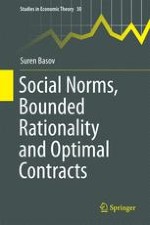
2016 | OriginalPaper | Buchkapitel
1. Introduction
verfasst von : Suren Basov
Erschienen in: Social Norms, Bounded Rationality and Optimal Contracts
Verlag: Springer Singapore
Aktivieren Sie unsere intelligente Suche, um passende Fachinhalte oder Patente zu finden.
Wählen Sie Textabschnitte aus um mit Künstlicher Intelligenz passenden Patente zu finden. powered by
Markieren Sie Textabschnitte, um KI-gestützt weitere passende Inhalte zu finden. powered by